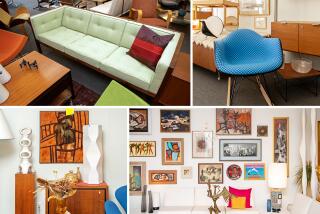A Movable Feast: Collectible Cars on Southland Auction Blocks
- Share via
For a serious car nut, there is no such thing as seeing too many collectible cars--even if the nut in question can’t even afford the sales tax on a desirable automobile.
If you fall into this category, a very good way to spend a weekend is to attend an auto auction specializing in collectible cars. They’re movable feasts for auto aficionados--and you don’t have to buy anything other than a $5 to $7 entry ticket.
Furthermore, since auctions often are held in such vacation places as Newport Beach, Monterey, Palm Springs and San Diego, you can combine your car hobby and a weekend jaunt.
The Southland is home base of two major firms catering to the car collector: Rick Cole Auctions of North Hollywood and Spectrum Auction Co. in Moorpark. Spectrum’s next Southland auction will be held June 23 and 24 at the Marriott Hotel in Woodland Hills. Rick Cole Auctions will hold its next Southland auction July 7-8 at the Hyatt-Newporter Resort in Newport Beach.
For auctions outside California, check Hemmings Motor News magazine, the bible of car collectors, available at larger newsstands or bookstores.
Spectrum is headed by Drew Donen and Kurt Hazard.
“I made plenty of money as a stockbroker, but it wasn’t fun anymore,” Donen said. “That’s when I decided to get into the car auctioning business with my friend, Kurt Hazard, who started the Car Bazaar at Devonshire Downs near Cal State Northridge back in 1977.”
Their first auction in 1984 brought the partners $186,000 from 517 cars sold. Now they hold about 10 auctions a year in Ventura, Santa Barbara, San Diego, Los Angeles, Woodland Hills, Irvine/Newport Beach, the San Francisco Bay area and Salt Lake City.
Collector auctions typically are held on weekends, with sellers bringing their cars in Friday nights. Some auctions are held on Fridays or Saturdays, but when the auction takes place over the entire weekend, cars usually are put on the block Saturday and Sunday, beginning about 11 a.m.
Recently, I visited both a Cole’s auction in Universal City, and a Spectrum auction at Hollywood Bowl.
Cars on display ran the gamut from antiques like brass radiator Model-T Fords and a chain-driven 1907 Buick touring car, to gems of the classic era like Packards, Chryslers, V-16 Cadillacs and Lincolns, to cars of the 1940s, ‘50s and ‘60s such as Mercury and Ford convertibles, Chevy Nomads, a 1949 Packard wood-bodied (woodie) station wagon, the classic two-seat Ford Thunderbird of 1955-57, Pontiac GTOs and Oldsmobile 442s.
Sports cars included Corvettes of the 1953-67 era, the prime collectibles of the most popular U.S. sports cars, plus the full range of British, German and Italian marques. There was even a rare Citroen DS-19 convertible.
Muscle cars of the late 1960s and early ‘70s--Dodge Chargers, Camaro Z28s, Pontiac GTOs, Oldsmobile 442s--are in demand these days by baby boomers who remember these cars from their “Wonder Years,” Rick Cole said.
Japanese cars are rarely on view at auctions, said Kurt Hazard, because only a few are considered collectible. But an early 1970s Datsun 240Z in prime condition is a good collectible car from Japan, he added, and the prices are relatively low. Toyota’s GT 2000 sports car from the 1960s is also very collectible, but very rare.
While Japanese cars are rare, Japanese and German and British buyers are not, Hazard said. Japanese buyers love Mercedeses and BMWs and Porsches--anything collectible as long as it’s German, he said. Japanese collectors, usually through American agents, also love American cars of the 1950s.
German buyers gravitate toward American muscle cars, prime-era Corvettes and luxury British cars, Hazard said, while British collectors appear to be repatriating many of their cars from the colonies to the mother country.
But, said Hazard, the massive collector-car price run-up of the 1980s has slowed down considerably, with “steady prices and some fluctuation.”
A good way to get the most out of an auction is to arrive early, between 9 and 10 a.m., and admire the cars on display in the staging area. Quite often, you can chat with owners and ask them why they’re selling their gems.
At a recent Cole auction, the owner of a pristine 1940 Mercury convertible told me he’d let it go for as little as $15,000 because he’d just bought a 1939 Mercury convertible (the first year for Mercury). His wife, he said, told him to limit himself to one Mercury at a time.
At a Spectrum auction, I chatted with the owner of a two-tone gray 1941 Cadillac sedan that was selling for $14,000 to $16,000. The Cadillac’s back seat allowed plenty of leg and head room for its 6-foot-4 owner.
Once inside the auction tent, you don’t have to worry about making the wrong hand signals and inadvertently buying a Duesenberg. Collectors have to register to bid on the cars being auctioned.
The word reserve will be used at the auto auction. It simply means the lowest amount the consignee (car owner) will take for the vehicle. If the bidding stops at $13,500, say, and the reserve is $15,000, the car won’t sell unless the consignee agrees to remove the reserve.
Cars that don’t sell at auction are driven back to the lot viewing area, where any well-heeled car nut still interested in buying can negotiate with the owner.
* Rick Cole Auctions, 10701 Riverside Drive, North Hollywood 91602, (818) 506-6533 . Spectrum Auction Co., 5450 Tech Circle, Moorpark 93021, (805) 523-0222.






